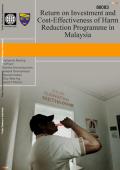Publications - Released in 2013
This project aimed to assess whether the harm reduction programmes in Malaysia, which consists of NSP and MMT programmes amongst PWID, have been cost-effective from the perspective of the government by estimating savings in direct health care cost to the government resulting from infections that were averted as a result of the NSP and MMT programmes. The following estimates were included in the estimate of savings in direct health care costs; estimate the cost-effectiveness of the NSP and MMT programmes in terms of costs for the provision of programmes net of health care cost savings for each quality-adjusted-life years (QALYs) gained; estimate the return on investment (ROI) from NSP and MMT programmes where ROI refers to total health care costs saved from averted infections in comparison to total programme costs.
Downloads
Organizations
- World Bank
- University of Malaya
- Kirby Institute
- University of New South Wales (UNSW Sydney)






